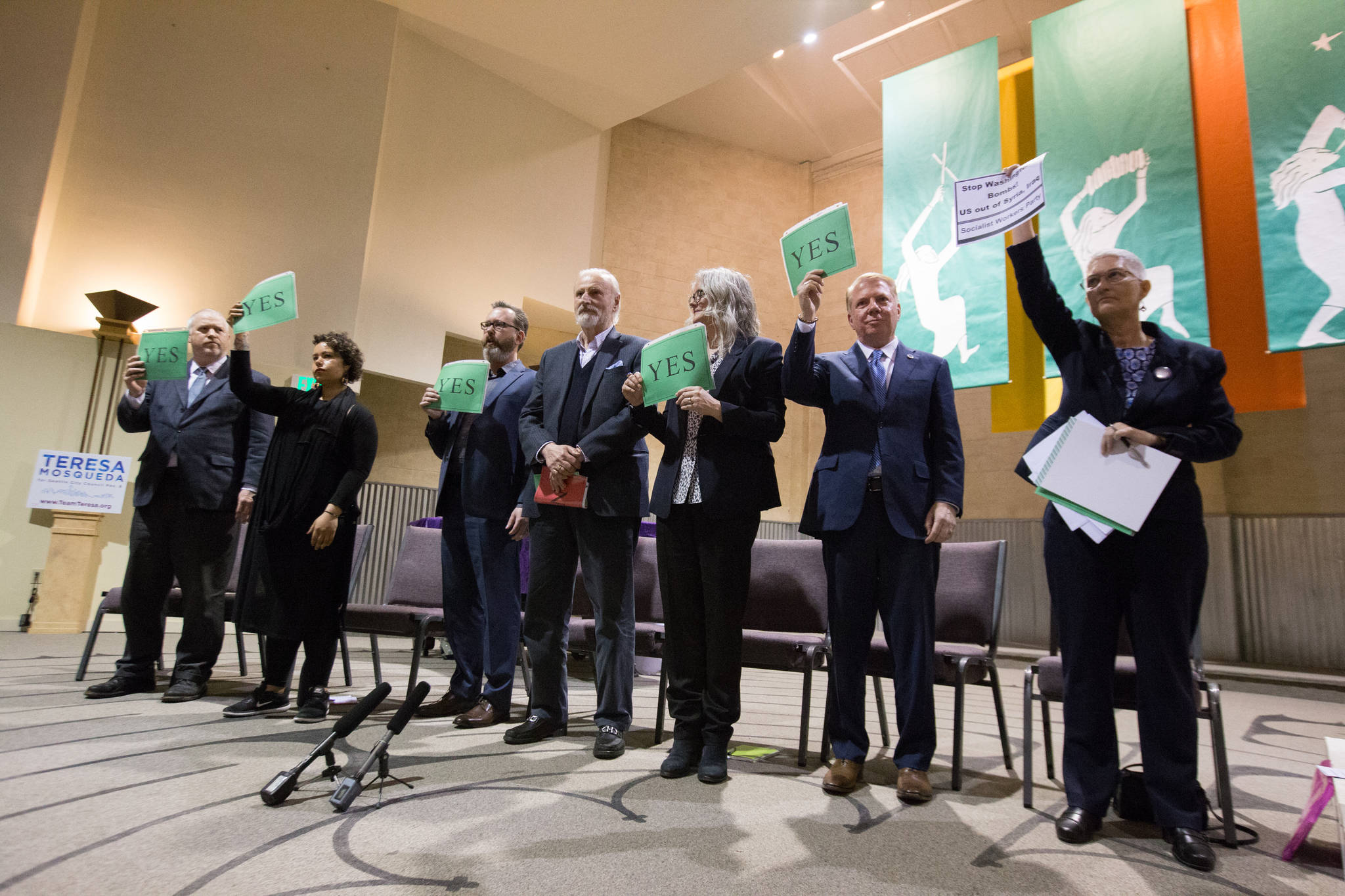During a debate in north Seattle Thursday night, Seattle Mayor Ed Murray announced that he will seek to pass a city income tax on rich Seattleites. Doing so will likely trigger a state Supreme Court case, the outcome of which will settle the longstanding question of whether or not the Washington constitution allows progressive income taxes.
“We all know that Washington state has a regressive system,” Murray said to the audience of several hundred people packed into the Seattle Mennonite Church for the debate, hosted by the 46th District Democrats. “We can all argue about what we’re going to do about it—these discussions have been going on since I was a kid in this city—but what I am going to send to council in the next few weeks is a proposal for a high-end income tax.” Here, Murray had to briefly pause for applause. “It’s going to be challenged…in court, but if we win in court and we can get that high-end income tax, we can shift our regressive taxes, our sales tax and property tax, onto that high end income tax.
“We did it on the minimum wage, we can do it on an income tax,” he said.
The comparison to the minimum wage is appropriate. During his first run for mayor in 2013, Murray won in part by coming out in favor the $15 minimum wage before then-mayor Mike McGinn did. This year, the prospect of a progressive (or graduated) income tax has begun to gain similar momentum. Voters and leaders have been grumbling more than usual about how regressive (that is, burdening the poor and favoring the rich) Washington’s tax system is, and every candidate except Cary Moon said that they supported an income tax at last night’s forum.
“Taxation is a big issue right now. That’s become very apparent over the last month or so,” Katie Wilson, general secretary of the Transit Riders Union (a member organization of Trump Proof Seattle, the primary organization pushing for a city income tax) told us earlier this week. “People are reaching the point where something needs to shift.”
Local politicians seem to sense the same need among voters. When McGinn declared his candidacy Monday, he criticized the mayor and council for relying on regressive sales and property taxes and said that if elected he would pursue an income tax. Murray already canceled a proposed property tax (that would have funded homelessness mitigation) from this fall’s ballot, and King County Executive Dow Constantine’s proposed sales tax on this fall’s ballot to fund arts programming is stalled in county council.
Murray’s specific decision to run an income tax in Seattle appears to have been made recently. Asked on Monday what the mayor’s position is on a city income tax, a spokesperson replied only that Murray “is supportive…but because of the likely court process, this proposal won’t address the immediate needs.” UPDATE: A spokesperson for Murray says the tax proposal “has been in the works for quite some time, consistent with Mayor Murray’s repeated statements supporting a more progressive tax system. We are looking forward to continuing the work with Councilmember Herbold as we go forward.”
During a “lighting round” of questions during last night’s debate in which candidates held up “YES” or “NO” cards in response to questions from the moderator, every candidate but Moon signaled that they support a city income tax.
While the long term goal of the tax would be to shift taxation from the poor to the rich, the immediate goal is to trigger a state Supreme Court case. “We’re trying to write [the tax] in a way that we believe is legally defensible,” Murray elaborated after the debate. He said that while the details are still being worked out, he anticipates sending first a resolution to council and then a series of bills enacting the goals of that resolution. The tax would be revenue neutral—that is, the money collected from it would be used to cut other taxes—with the exception of possibly paying for federal budget cuts from the Trump administration, he said. “The idea is we would identify the most regressive taxes that would then be lowered and replaced [by] this,” he said, “as well as leaving some capacity for potential Trump cuts.”
Asked why the tax will be passed by council instead of sent to the public for a ballot vote, Murray replied, “Why have a vote on something that is theoretical?” The goal of the tax, he said, is “we’re looking for a chance to get into court and answer this question” of whether the state constitution allows for graduated income taxes.
“We expect to be sued,” he said, “and then we’ll go from there.”
UPDATE. Trump Proof Seattle formally responded to Murray’s announcement that he will seek to pass a city income tax in a press release on Friday, April 21.
“Mayor Ed Murray’s support for a city tax on high-income households has grabbed headlines,” the release reads in part. “He is the latest in a growing list of public figures to endorse the idea in response to the efforts of the Trump Proof Seattle Coalition, which has proposed a city-wide tax of 1.5% on income in excess of $250,000. The Economic Opportunity Institute estimates that this would raise over $125 million per year in the City of Seattle.”
According to the release, a majority of the council support Trump Proof Seattle’s proposal to tax income on high earners: Lisa Herbold, Kshama Sawant, Mike O’Brien, Rob Johnson and Bruce Harrell. More information, including details for upcoming town halls, is available on their website.
cjaywork@seattleweekly.com
This post has been updated. A previous version of this story stated that Moon signaled support for an income tax. She does not, arguing that the legal hurdles for an income tax make her wary of the proposal. She says she supports taxes on real estate speculation, luxury real estate, and capital gains.








